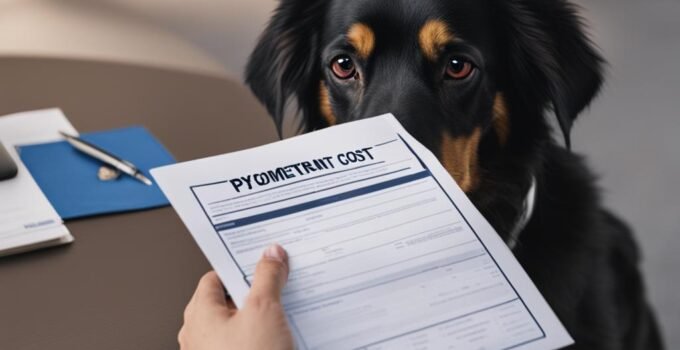Pyometra is a serious uterine bacterial infection that affects unspayed female dogs. It is important for pet owners to know whether their pet insurance covers the treatment for pyometra, especially the cost of surgery. The cost of pyometra surgery can vary depending on factors such as the severity of the infection, the breed, age, and size of the dog, and the location of the veterinary clinic. It is important to review your pet insurance policy to determine if pyometra surgery is covered and to understand the extent of coverage for this critical health issue in pets.
Key Takeaways:
- Pyometra is a serious uterine bacterial infection that affects unspayed female dogs.
- The cost of pyometra surgery can vary based on factors such as the severity of the infection and the dog’s breed, age, and size.
- Review your pet insurance policy to determine if pyometra surgery is covered and to understand the extent of coverage.
- Preventative measures such as spaying can help reduce the risk of pyometra in dogs.
- Enrolling in pet insurance can provide financial protection and help mitigate the costs associated with pyometra treatment.
Understanding Pyometra and Its Causes
Pyometra is a serious uterine bacterial infection that commonly affects unspayed female dogs. It occurs when the uterine lining thickens during the heat cycle, creating an ideal environment for bacterial growth. This thickening, combined with high levels of progesterone and decreased white blood cell count in the uterus, makes it more susceptible to infections.
Pyometra is most commonly seen in older female dogs who have gone through multiple heat cycles without pregnancy. The infection typically occurs two weeks to two months after the last heat cycle. It is important for pet owners to be aware of the risk factors and symptoms of pyometra to seek prompt veterinary care.
Common symptoms of pyometra in dogs include vaginal discharge, listlessness, fatigue, loss of appetite, changes in thirst or urination, and a large or swollen abdomen. Recognizing these signs and seeking veterinary attention immediately is crucial for the well-being and treatment of the affected dog.
The Cost of Pyometra Surgery
When it comes to pyometra surgery, the cost can vary depending on several factors. While a standard, non-emergency spay operation can range from $50 to $500, emergency pyometra surgery expenses are significantly higher, averaging around $1,000 to $1,500 or even more. The severity of the infection, breed, age, and size of the dog, as well as the location of the veterinary clinic, are all influencing factors that can affect the cost of the surgery.
It’s important for pet owners to understand and be prepared for these costs, especially considering whether their pet insurance covers pyometra surgery expenses. Additionally, there may be additional expenses to consider, such as preliminary treatments like antibiotics and IV support, as well as post-operative medication for the dog’s recovery. By being aware of the potential costs associated with pyometra surgery, pet owners can make informed decisions about their pet’s healthcare.
| Veterinary Treatment | Average Cost |
|---|---|
| Standard Spay Operation | $50 – $500 |
| Emergency Pyometra Surgery | $1,000 – $1,500 or more |
Note: The cost ranges provided are approximate and can vary based on factors such as the severity of the infection, breed, age, size of the dog, and the location of the veterinary clinic.
Factors Affecting the Cost of Pyometra Surgery
When it comes to determining the cost of pyometra surgery, several factors come into play. Understanding these factors can help pet owners anticipate potential expenses and make informed decisions. The primary factor that affects the cost is the severity of the pyometra case. Dogs with more advanced infections may require additional medical treatments and emergency stabilization, leading to higher overall costs.
Pyometra surgery is more complex and labor-intensive compared to routine spays, which contributes to the higher cost. The procedure involves removing the infected uterus, and the surgeon must take extra precautions to ensure the dog’s safety and well-being during the surgery.
Older dogs with fragile health and critical conditions pose higher risks during surgery, which can also impact the cost. These dogs may require additional monitoring and post-operative care to ensure a successful recovery.
Emergency pyometra surgeries performed outside of regular veterinary hours may incur additional fees. These emergency services often involve a higher level of urgency and require specialized staffing, equipment, and resources.
By considering these factors, pet owners can better understand why pyometra surgery can be costly and make informed financial decisions regarding their pet’s healthcare.
Unexpected Costs Associated with Pyometra Surgery
While pyometra surgery itself can be a significant expense, pet owners should also be aware of potential unexpected costs that may arise during the treatment process. Extended hospitalizations following pyometra surgery are common, particularly for dogs with more chronic cases or complications during the procedure. These extended hospital stays can result in additional costs ranging from $700 to $3,500 or more, depending on the duration of the hospitalization and the necessary medical care provided.
In some cases, excessive blood loss during pyometra surgery may require a blood transfusion to stabilize the dog’s condition and aid in their recovery. The need for a blood transfusion can further increase the total cost of pyometra surgery. Pet owners should be prepared for the potential need for this procedure and the associated costs it may incur.
To visually demonstrate the potential range of extended hospitalization costs, the table below provides an overview:
| Extended Hospitalization Duration | Cost Range |
|---|---|
| 1-3 days | $700 – $1,500 |
| 4-7 days | $1,500 – $2,500 |
| 8 or more days | $2,500 – $3,500+ |
It is essential for pet owners to be aware of these potential unexpected costs associated with pyometra surgery. By being prepared and informed, pet owners can make the necessary financial arrangements to ensure their beloved pets receive the best possible care and treatment.
Does Pet Insurance Cover Pyometra Surgery?
Whether you can get coverage for pyometra surgery through your pet insurance policy depends on your insurer. To determine if pyometra surgery is covered, it’s essential to review the exclusions in your policy. In most cases, pyometra is considered an emergency illness under accident-illness policies, and the necessary treatment is typically covered. However, if your dog has recently been diagnosed with pyometra and you are not yet enrolled in pet insurance, the surgery costs may not be covered as it could be considered a pre-existing condition.
Some pet insurance providers offer coverage for spay/neuter surgeries as part of their wellness or preventative care add-on plans. Consider adding this coverage to your policy to ensure that you have coverage for pyometra treatment. By understanding your pet insurance policy and considering the appropriate coverage options, you can be better prepared for unexpected veterinary expenses related to pyometra.
To illustrate the variations in coverage for pyometra surgery across different pet insurance providers, I have compiled the following table:
| Insurance Provider | Does pet insurance cover pyometra surgery? |
|---|---|
| Provider A | Yes |
| Provider B | No |
| Provider C | Yes, as part of a wellness/add-on plan |
As you can see from the table, the coverage for pyometra surgery varies. It is crucial to research different insurance providers and their policies to find the best coverage for your pet’s needs. By choosing the right pet insurance plan, you can ensure that your furry friend receives the necessary treatment without facing significant financial burdens.
Prevention of Pyometra
Spaying dogs is the most effective method for preventing pyometra in dogs. Spaying involves the surgical removal of the uterus, eliminating the risk of developing this potentially life-threatening uterine bacterial infection. It is strongly recommended to have your dog spayed before pyometra becomes a problem. Emergency surgery for an infected dog is more complicated and costly, and the condition can pose a significant risk to your dog’s health and well-being.
By spaying your dog, you can significantly reduce the risk of her developing pyometra. Spaying eliminates the hormonal changes that occur during heat cycles, which create an environment favorable for the development of uterine infections. Additionally, it eliminates the risk associated with pregnancy and complications related to breeding.
If you suspect that your dog may have pyometra, it is crucial to seek immediate veterinary care. Only a qualified veterinarian can accurately diagnose and treat this condition. Early detection and prompt treatment can improve the chances of a successful outcome for your furry companion.
Spaying your dog is a responsible and proactive measure to protect her from pyometra. It not only eliminates the risk of this dangerous infection but also offers other health benefits. Discuss the timing and procedure of spaying with your veterinarian to determine the best approach for your dog’s individual needs.
Understanding Pyometra Treatment Options
The most common and effective treatment for pyometra is an ovariohysterectomy, also known as spaying. This surgical procedure involves the removal of the uterus, eliminating the source of the infection. Spaying not only treats the current case of pyometra but also prevents future occurrences.
For dogs that contribute value to the breeding population and cannot undergo surgery, non-surgical treatment options such as prostaglandin injections may be considered. These injections work by inducing uterine contractions to expel the pus-filled contents of the uterus. However, it is important to note that the success rate for non-surgical treatment is significantly lower compared to surgical treatment, and there can be serious side effects.
It is crucial for pet owners to consult with a veterinarian to determine the best treatment option for their dog’s pyometra. The veterinarian will assess the severity of the infection, the overall health of the dog, and consider factors such as future breeding plans before recommending the most suitable course of action.
Below is a comparison table highlighting the key differences between surgical and non-surgical treatment options for pyometra:
| Treatment Option | Pros | Cons |
|---|---|---|
| Surgical Treatment | – Eliminates the source of the infection – Prevents future occurrences – Higher success rate | – The need for anesthesia and surgery – Higher cost |
| Non-Surgical Treatment | – No need for anesthesia and surgery – Suitable for dogs that cannot undergo surgery | – Lower success rate – Potential side effects – May not prevent future occurrences |
It is important to note that pyometra is a potentially life-threatening condition, and timely treatment is crucial for a successful outcome. Consultation with a veterinarian is essential to discuss the best treatment option for your dog’s specific circumstances.
Pet Insurance and Preventative Care
While few pet insurance providers include reimbursements for spay/neuter surgeries in their base plans, some providers offer coverage for these procedures in their wellness or preventative care add-on plans. It is important for pet owners to consider adding this coverage to their pet insurance policy to ensure their dog receives the necessary preventative care, including spaying to prevent pyometra. Having coverage for preventative care can help pet owners manage the costs associated with maintaining their dog’s overall health and well-being.
| Pet Insurance Provider | Add-On Coverage for Spay/Neuter Surgeries |
|---|---|
| Pumpkin | Yes |
| Petplan | No |
| Trupanion | No |
Importance of Prompt Treatment for Pyometra
When it comes to pyometra, prompt treatment is of utmost importance. This serious condition, if left untreated, can lead to life-threatening complications for your beloved pet. The risks of untreated pyometra include sepsis, kidney failure, and even death. Therefore, it is crucial for pet owners to seek immediate veterinary care if they suspect their dog has pyometra.
Early diagnosis and treatment significantly increase the chances of a successful outcome. By addressing pyometra promptly, you can prevent the infection from spreading and causing further damage to your dog’s health. Not only does timely treatment improve the prognosis, but it also minimizes the overall cost of pyometra treatment.
By seeking veterinary care as soon as you notice any symptoms or suspect pyometra, you can potentially avoid the need for more extensive and costly procedures. Early intervention allows for less invasive treatment options, reducing the financial burden on pet owners while ensuring the best possible outcome for their furry companions.
Remember, time is of the essence when it comes to pyometra. Don’t hesitate to reach out to your veterinarian if you have any concerns. Your swift action can make all the difference in saving your dog’s life and promoting their long-term health and well-being.
| | Importance of Prompt Treatment for Pyometra |
|——————-|—————————————————————————————————————|
| **Keywords** | importance of prompt treatment for pyometra, risks of untreated pyometra |
| **Description** | Prompt treatment is crucial for pyometra to prevent life-threatening complications and minimize overall costs. |
Reiterating the Importance of Pet Insurance
Enrolling your pet in a pet insurance plan can provide essential financial protection and peace of mind. Having a pet insurance policy ensures that you are prepared for unexpected health issues that may arise, such as pyometra. Pet insurance plans, like those offered by Pumpkin, can reimburse up to 90% of covered veterinary bills, helping to alleviate the financial burden of treatment.
One of the key benefits of pet insurance is that it allows pet owners to focus on providing the best care for their furry companions without constantly worrying about the cost. With the rising costs of veterinary care, having pet insurance can provide a safety net, ensuring that you can make well-informed decisions about your pet’s health without financial constraints.
By enrolling in a pet insurance plan, you are taking a proactive step to safeguard your pet’s well-being and your financial stability. Whether it’s routine check-ups, vaccinations, or unexpected illnesses or accidents, pet insurance offers financial protection for all aspects of your pet’s healthcare needs.
When considering pet insurance options, it’s important to review the coverage and exclusions. Look for plans that cover a wide range of conditions and treatments, including surgeries like pyometra, to ensure that you have comprehensive coverage. It’s also a good idea to compare the costs and benefits of different plans and choose the one that best suits your pet’s needs and your budget.
Overall, pet insurance is an invaluable investment for pet owners. It provides the financial protection needed to ensure that your furry friend receives the necessary care and treatment, giving you peace of mind and allowing you to focus on what matters most – the health and happiness of your beloved pet.
Conclusion
Dealing with pyometra can be both emotionally and financially challenging for pet owners. The cost of pyometra surgery can vary depending on factors such as the severity of the infection and the location of the veterinary clinic. It is crucial for pet owners to carefully review their pet insurance coverage to determine if pyometra surgery is included and to understand the extent of reimbursement for this critical health issue.
Preventing pyometra through spaying is the best approach, as it eliminates the risk of developing this uterine bacterial infection. However, if pyometra does occur, prompt veterinary treatment is essential to prevent life-threatening complications. Pet insurance can provide the necessary financial protection and help mitigate the costs associated with pyometra treatment, including surgery and post-operative care.
Enrolling in pet insurance and staying proactive about preventative care, such as regular check-ups, vaccinations, and spaying, can help ensure the best possible outcome for your furry companion’s health. By being prepared and having the financial support of pet insurance, pet owners can focus on providing the best care for their beloved pets without the added stress of unexpected veterinary expenses.



